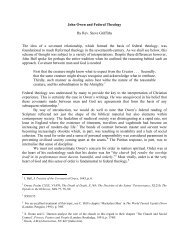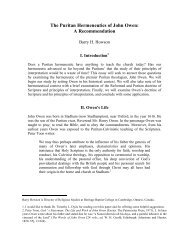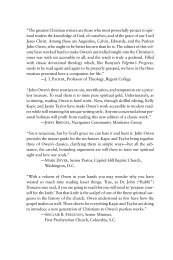M.TH. LONG DISSERTATION (LD6.1) - John Owen
M.TH. LONG DISSERTATION (LD6.1) - John Owen
M.TH. LONG DISSERTATION (LD6.1) - John Owen
Create successful ePaper yourself
Turn your PDF publications into a flip-book with our unique Google optimized e-Paper software.
<strong>John</strong> <strong>Owen</strong>’s Theological Context<br />
the Reformed tradition, describes the union as mystical, or spiritual. We can also see why<br />
mystical union with Christ is unique, and far more intimate even than the one flesh union<br />
between a man and his wife, or the natural union between a vine and its branches. Thus,<br />
because the elect are truly united to Christ in this profound way, truly and spiritually<br />
members of his mystical body, the justice of imputation is secured, for he ‘bare the<br />
person of the church in what he did as mediator, in the holy, wise disposal of God as the<br />
author of the law, the supreme rector or governor of all mankind, as unto their temporal<br />
and eternal concernments, and by his own consent’. 151 Hence, their sins were justly<br />
imputed to him. <strong>Owen</strong> again asserts that not only is this viewpoint supported by<br />
Scripture, it is also, ‘the faith and language of the church in all ages’. 152<br />
Thus, according to <strong>Owen</strong>, in line with Reformed Orthodoxy, the relationship<br />
between Christ and the elect that underlies imputation is sui generis. However, it does not<br />
conflict with or render irrelevant the other grounds of imputation that <strong>Owen</strong> has already<br />
outlined. As we have seen, the foundation for the union is found in the covenant of<br />
redemption: Christ voluntarily undertook to stand as surety and covenant head for the<br />
elect (ex voluntaria sponsione), and so to become one mystical person with them. Moreover,<br />
because he voluntarily undertook to become the covenant head and mediator for his<br />
people, the union also finds a foundation ex mera gratia. Finally, precisely because Christ<br />
and the church are one person, it is also just for God to reckon their sin to him, and his<br />
righteousness to them (imputation ex iustitia). Hence, in assuming the office of mediator<br />
voluntarily:<br />
There was a concurrence of his own will in and unto all those divine acts<br />
whereby he and the church were constituted one mystical person; and of his<br />
own love and grace did he as our surety stand in our stead before God, when<br />
151 <strong>Owen</strong> 1850-55: V.196.<br />
152 <strong>Owen</strong> 1850-55: V.196.<br />
41





